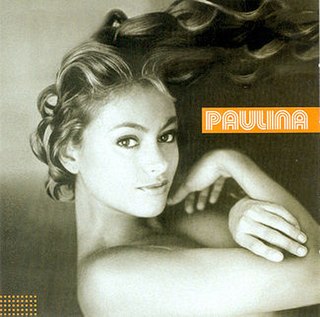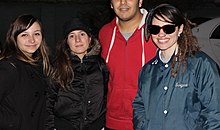
Paulina Susana Rubio Dosamantes is a Mexican singer. Referred to as "The Golden Girl" and "Queen of Latin Pop", she first achieved recognition as a member of the successful pop group Timbiriche from 1982 through 1991. After leaving Timbiriche, she embarked on a solo career. Rubio has sold over 15 million records, making her one of the best-selling Latin music artists of all time.

Gabriela Alejandra Guzmán Pinal, known professionally as Alejandra Guzmán, and nicknamed "La Reina de Corazones" is a Mexican musician, singer, composer, and actress. With more than 30 million albums sold throughout her career, and winner of a Latin Grammy, she is one of the most successful Mexican female singers. She is the daughter of actress Silvia Pinal and singer Enrique Guzmán.

Blondie is an American rock band co-founded by singer Debbie Harry and guitarist Chris Stein. The band was a pioneer in the American new wave scene of the mid-1970s in New York. Their first two albums contained strong elements of punk and new wave, and although highly successful in the UK and Australia, Blondie was regarded as an underground band in the U.S. until the release of Parallel Lines in 1978. Over the next four years, the band achieved several hit singles including "Heart of Glass," "Call Me," "Atomic," "The Tide Is High," and "Rapture". The band became noted for its eclectic mix of musical styles, also incorporating elements of disco, pop, reggae, and early rap music.

Luis Miguel Gallego Basteri is a Puerto Rican-born Mexican singer, often referred to as El Sol de México, which is the nickname his mother gave him as a child—"mi sol". Luis Miguel has sung in multiple genres and styles, including pop songs, ballads, boleros, tangos, jazz, big band, and mariachi. Luis Miguel is also recognized as the only Latin singer of his generation to not cross over to the Anglo market during the "Latin Explosion" in the 1990s.

Babasónicos is an Argentine rock band, formed in the early 1990s along with others such as Peligrosos Gorriones and Los Brujos. After emerging in the wave of Argentine New Rock bands of the late 1980s and early 1990s, Babasonicos became one of the banner groups of the "sonic" underground rock movement in Argentina in the late 1990s.
Chilean rock is rock music and its corresponding subgenres produced in Chile or by Chileans. Chilean rock lyrics are usually sung in Spanish so can be considered as part of rock en español, although sometimes are sung in English as well.

Skank is a Brazilian band from Belo Horizonte. Having begun in 1991, they sold approximately 5,200,000 copies of their albums as of 2004. Initially intending to mix dancehall with traditional Brazilian styles, later the band changed its sonority to music closer to Britpop and local movement Clube da Esquina.

Diego Antonio Caccia, known as Diego Torres, is an Argentine two Grammy Award-nominated pop singer, songwriter, composer, musician and actor. He is the son of the legendary Argentine artist Lolita Torres (1930–2002).

Kudai are a Chilean pop rock band from Santiago, Chile, formed in early 2000. The group is composed of Pablo Holman, Bábara Sepúlveda, Tomás Manzi, and Nicole Natalino, who left the group in 2006 citing personal reasons, and was replaced by Ecuadorian Gabriela Villalba for three years. After the group disbanded in 2010, in November 2016, the band confirmed their return to the scene with the original members.

Paulina is the fifth studio album by Mexican singer Paulina Rubio. It was released on May 23, 2000 internationally by Universal Latino and marks her first record production with American global music corporation. Rubio worked with writers and producers such as Estéfano (mostly), Armando Manzanero, Juan Gabriel, Christian De Walden, and Richard Daniel Roman. The album explores a more variety sounds much different to the vein of her albums with EMI Music, and has an overall latin pop and dance-pop vibe, with influences from rock, ranchera, bolero, funk and house. Elaborating a "synthesis of the end of the millennium" theme for the album, Rubio reinvented her image.

Azul (Blue) is the seventh studio album recorded by Mexican singer and songwriter Cristian Castro. It was released by BMG U.S. Latin on June 5, 2001. It was produced again by Colombian songwriter and record producer Kike Santander working last album Cristian's Mi Vida Sin Tu Amor (1999). It was nominated Grammy Award for Best Latin Pop Album in the 44th Annual Grammy Awards on February 27, 2002. The title track, "Azul", topped the Latin charts.

Flavio Enrique "Kike" Santander Lora is a Colombian-American composer, record producer, arranger and entrepreneur. He is considered to be one of the principal Latino composers of the day, having worked with artists such as David Bisbal, Cristian Castro, Thalía, Chayanne, Diego Torres, Davi Wornel, Alejandro Fernández, Olga Tañón, Bacilos, José Luis Rodríguez «El Puma» and Gloria Estefan among others. Santander has composed more than 710 songs and has sold over 25 million albums worldwide. His work as songwriter and producer includes themes such as Let's Get Loud by Jennifer Lopez, Abriendo puertas by Gloria Estefan, Me Estoy Enamorando by Alejandro Fernández, Mi Vida Sin Tu Amor by Cristian Castro, and Premonición by David Bisbal, as well as many songs recorded by artists such as Thalía, Natalia Oreiro, Gisselle, Edith Márquez, Luis Miguel, Soledad Pastorutti and the Spanish song for Eurovision Song Contest 2004, amongst others.

Myriam Raquel Hernández Navarro is a Chilean singer, songwriter and television presenter. She has dabbled mainly in romantic ballad, which is why she is sometimes nicknamed "La baladista de América", although she has also fused her style with other genres such as electronics or hip-hop.

Camila Moreno is a Chilean rock and folk singer-songwriter.

Entren Los Que Quieran is the fourth studio album by Puerto Rican hip hop band Calle 13, released on November 22, 2010. Recorded in the wake of controversial events surrounding the group, the album contains more political lyrical themes not discussed on previous Calle 13 releases. It also expands upon the musical experimentation demonstrated in the group's albums Residente o Visitante (2007) and Los de Atrás Vienen Conmigo (2008). The record's compositions feature various musical styles, including rock, ska, merengue, reggaeton, and Bollywood music.

Supernova is a studio album by The Gonzalo Rubalcaba Trio released by Blue Note Records on July 17, 2001. The trio consisted of Gonzalo Rubalcaba on piano, bassist Carlos Henriguez, and drummer Ignacio Berroa. It peaked at number 25 in the Billboard Top Jazz Albums chart.
The Lo Nuestro Award for Pop Album of the Year was an honor presented annually by American television network Univision at the Lo Nuestro Awards. The accolade was established to recognize the most talented performers of Latin music. The nominees and winners were originally selected by a voting poll conducted among program directors of Spanish-language radio stations in the United States and also based on chart performance on Billboard Latin music charts, with the results being tabulated and certified by the accounting firm Deloitte. However, since 2004, the winners are selected through an online survey. The trophy awarded is shaped in the form of a treble clef.

The Premios Gardel a la Música, or just Premios Gardel, is an award presented by the Argentine Chamber of Phonograms and Videograms Producers (CAPIF) to recognize the best of Argentine music and to award the talent of Argentine artists in a diversity of genres and categories. The trophy depicts a sculpture of French Argentine tango singer Carlos Gardel, one of Argentina's music icons. The annual presentation ceremony features performances by prominent artists, and the presentation of awards that have more popular interest.
















